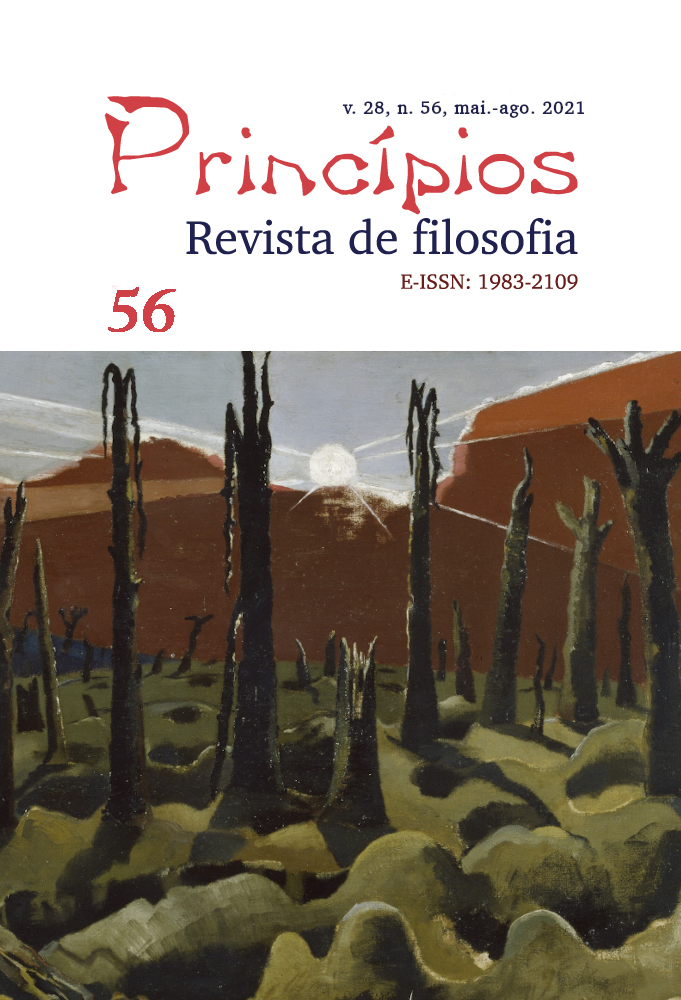Mapa de Araújo para andar nas encruzilhadas entre a tecnologia e a moral: Resenha de Novas tecnologias e dilemas morais, de Marcelo de Araújo
DOI:
https://doi.org/10.21680/1983-2109.2021v28n56ID24097Palavras-chave:
Biotecnologia, Bioética, Aprimoramento Humano, Tecnologia de reprodução assistidaResumo
Resenha da obra ARAUJO, Marcelo de. Novas tecnologias e dilemas morais. São Paulo: KDP (Amazon), 2019.
Downloads
Referências
ARAUJO, Marcelo de. Human Rights and Assisted Reproductive Technologies (ART): A Contractarian Approach. Canadian Journal of Bioethics/Revue canadienne de bioéthique, v. 3, n. 3, p. 192-201, 2020.
ARAUJO, Marcelo de. Novas tecnologias e dilemas morais. São Paulo: KDP (Amazon), 2019.
ARAUJO, Marcelo de. Editing the genome of human beings: CRISPR-Cas9 and the ethics of genetic enhancement. Journal of Evolution and Technology, v. 27, p. 24-42, 2017.
ARAUJO, Marcelo de. Ética nos esportes: revisitando a questão do doping à luz do debate sobre aprimoramento humano. Prometheus-Journal of Philosophy, 2016.
ARAUJO, Marcelo de. René Descartes e a refutação do ceticismo: Verdade, coerência e correspondência. São Paulo: KDP (Amazon), 2014.
ARAUJO, Marcelo de. Dom Pedro II e a moda masculina na época vitoriana. São Paulo: Estação da Cores e Letras, 2012.
BARNES, Elizabeth. Valuing disability, causing disability. Ethics, v. 125, n. 1, p. 88-113, 2014.
BARNES, Elizabeth. Reply to Guy Kahane and Julian Savulescu. Res Philosophica, 2016.
CAVALIERE, Giulia. Gestation, equality and freedom: ectogenesis as a political perspective. Journal of medical ethics, v. 46, n. 2, p. 76-82, 2020.
CHEOK, Adrian David; KARUNANAYAKA, Kasun; ZHANG, Emma Yann. Lovotics: Human-robot love and sex relationships. Robot Ethics 2.0: New Challenges in Philosophy, Law, and Society, v. 193, p. 193-213, 2017.
COOK, Hera et al. The long sexual revolution: English women, sex, and contraception 1800-1975. Oxford University Press on Demand, 2004.
DE SOUSA, Maria Clara Paixão. O Corpus Tycho Brahe: contribuições para as humanidades digitais no Brasil. Filologia e Linguística Portuguesa, v. 16, n. esp., p. 53-93, 2014.
DODDS, Peter Sheridan; DANFORTH, Christopher M. Measuring the happiness of large-scale written expression: Songs, blogs, and presidents. Journal of happiness studies, v. 11, n. 4, p. 441-456, 2010.
KAHANE, Guy; SAVULESCU, Julian. Disability and mere difference. Ethics, v. 126, n. 3, p. 774-788, 2016.
LARSEN, Mark E. et al. We feel: mapping emotion on Twitter. IEEE journal of biomedical and health informatics, v. 19, n. 4, p. 1246-1252, 2015.
LAWLOR, Rob. Questioning the significance of the non-identity problem in applied ethics. Journal of medical ethics, v. 41, n. 11, p. 893-896, 2015.
PARENS, Erik; ASCH, Adrienne (Ed.). Prenatal testing and disability rights. Georgetown University Press, 2000.
PETERSEN, Thomas Søbirk. Arguments on thin ice: on non-medical egg freezing and individualisation arguments. Journal of medical ethics, 2020.
PAULLADA, Amandalynne et al. Data and its (dis) contents: A survey of dataset development and use in machine learning research. arXiv preprint arXiv:2012.05345, 2020.
PETROPANAGOS, Angel et al. Social egg freezing: risk, benefits and other considerations. CMAJ, v. 187, n. 9, p. 666-669, 2015.
REAGAN, Andrew J. et al. The emotional arcs of stories are dominated by six basic shapes. EPJ Data Science, v. 5, n. 1, p. 1-12, 2016.
SCHWARTZ, Aaron J. et al. Visitors to urban greenspace have higher sentiment and lower negativity on Twitter. People and Nature, v. 1, n. 4, p. 476-485, 2019.
VIETH, Andreas; QUANTE, Michael. Quimera humana? A importância da natureza humana em tempos de xenotransplantes. Veritas (Porto Alegre), v. 58, n. 1, p. 9-36, 2013.
WHITBY, Blay. Do You Want a Robot Lover? The Ethics of Caring Technologies. Robot ethics: The ethical and social implications of robotics, 2011.
ZHANG, Wei et al. Daily happiness and stock returns: Some international evidence. Physica A: Statistical Mechanics and its Applications, v. 460, p. 201-209, 2016.
Downloads
Publicado
Como Citar
Edição
Seção
Licença
Autores mantêm os direitos autorais e concedem à revista o direito de primeira publicação, com o trabalho simultaneamente licenciado sob a Licença Creative Commons Attribution que permite o compartilhamento do trabalho com reconhecimento da autoria e publicação inicial nesta revista.
Termos da licença:
| Não Comercial (NC) | Os licenciados podem copiar, distribuir, exibir e executar a obra e fazer trabalhos derivados dela, desde que sejam para fins não comerciais. |
| Compartilha Igual (SA) | Os licenciados devem distribuir obras derivadas somente sob uma licença idêntica à que governa a obra original ou menos restritiva. |


 Português (Brasil)
Português (Brasil) English
English Español (España)
Español (España) Français (Canada)
Français (Canada)


